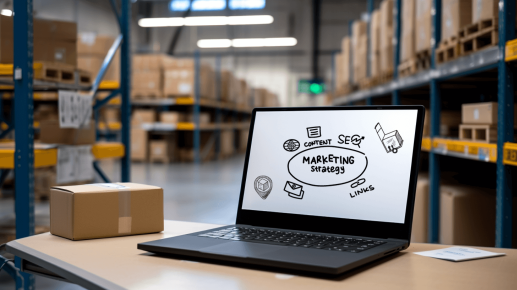The Council of Supply Chain Management’s 2023 State of Logistics reports logistics accounts for 9.1% of the nation’s GDP. Logistics is a huge industry with continued growth. With thousands of providers to choose from, customers have the power to be selective. From one end of the supply chain to the other, logistics companies prioritize minimizing transportation costs. Truckers, transporters, and distributors– even businesses as niche as SaaS warehouse management software providers – focus on boosting asset utilization, increasing productivity and improving efficiencies across all operations. Ironically, while tremendous amounts of time and effort are invested in improving processes and services that will help logistics organizations, very little of those same resources is spent on actually marketing these services to those who would benefit from their use. That’s because you’re in logistics, not marketing. You may be struggling with how to get clients in the logistics business.
The key advantage to leveraging these strategies and channels is that they work very well together. You may opt to pursue any one individual strategy depending on your goals and scope of the project, but combining them increases the likelihood of higher returns, as each one feeds into the other – resulting in more traffic, repeat customers, and higher conversion rates. Online marketing can help boost your logistics business substantially.
How to Get Clients in the Logistics Business: The Power of Digital Marketing
Online marketing is the most powerful marketing strategy for a logistics company. It’s a potent and personalized approach to reach your ideal customers and hit sales goals. Online marketing expands your network, compels targets to consider your offer and converts these leads to sales.
Let’s look at seven powerful strategies that grow any logistics business:
1. Build Trust and Showcase Expertise
In the logistics industry, where complexity and high stakes are the norms, building trust and demonstrating expertise are crucial marketing strategies. Unlike other sectors, logistics involves significant investment and intricate B2B dynamics, making trust not just a benefit but a prerequisite for client engagement. The key decision-makers in this field are often seasoned professionals, who value reliability and a proven track record over aggressive sales pitches and flashy marketing.
Effective marketing for logistics goes beyond mere promotion; it requires a deep understanding of the client’s specific needs and the ability to align services with these requirements. The sales and marketing approach must reflect the complexity of the services offered, whether it’s trucking or more intricate 3PL/4PL solutions. Broad, generic marketing tactics are less effective than focused, strategic efforts like targeted SEO or AdWords campaigns, which emphasize quality leads over quantity.
A crucial aspect of logistics marketing is recognizing the length and intricacy of the sales cycle. This understanding should inform a dual-strategy approach, catering to both immediate spot needs and long-term partnerships. Logistics firms must not only promise but also consistently deliver on their commitments, using their marketing channels to communicate this reliability and expertise effectively.
Ultimately, for a provider to succeed in the crucial task of how to get clients in the logistics business, its marketing strategy must be firmly rooted in building trust and demonstrating transparency and experience. This approach reassures potential clients of the firm’s capability to handle their logistics needs with utmost efficiency and reliability.
2. Strategically Segment Audiences
Successful logistics marketing demands identifying distinct buyer personas by analyzing service offerings and their alignment with various supply chain stages. Effective channel strategies and messaging will vary widely – be they brokers, 3PLs, carriers or shippers.
This approach involves scrutinizing existing clients to understand primary demographics while seeking potential untapped market segments. Crafting detailed profiles of these personas, focused on firmographics, decision-making processes, and unique service needs, is essential.
Tailoring marketing strategies to address specific pain points and preferences, whether related to freight efficiency, cost-effectiveness, or comprehensive logistics solutions, enhances client engagement. Understanding whether logistics decisions are made by individuals or committees in target companies further refines marketing efforts.
This targeted approach in logistics marketing not only improves client acquisition but also positions your company as a strategic partner attuned to diverse logistics needs.
3. Optimize Website for Conversion Rate Optimization (CRO)
For logistics providers, a website optimized for Conversion Rate Optimization (CRO) is vital in a competitive market. A compelling, user-friendly online presence increases the likelihood of potential clients spending more time on your site, thereby enhancing sales opportunities. The key is to balance clean design with effective branding that communicates your expertise in supply chain management and logistics solutions.
Once traffic is directed to your site, the goal shifts to maximizing the value of each visitor by converting passive browsers into active leads. Strategic placement of call-to-action (CTA) buttons on high-traffic areas like service descriptions and informative blogs is crucial. These CTAs should offer clear engagement opportunities, such as quotes or consultations, tailored to the logistics industry.
Effective CRO in logistics not only involves enhancing user experience but also focuses on transforming site visits into tangible business inquiries. This approach ensures a higher return on marketing investment, leveraging your website as a key tool in generating leads and driving sales.
4. Content Marketing
Creating high quality content on your website builds credibility, engages visitors and encourages them to return to your site in the future. It is extremely important to create content for your target audience. Content should be relatable, educational and resonate with your brand. Valuable information can be displayed in the form of a blog, eBook, downloadable pdf, infographics and/or slides. Content marketing for SaaS providers and other logistics companies is an incredible technique to attract traffic to your site.

5. Search Engine Optimization (SEO)
Search Engine Optimization is exactly what the name suggests, optimizing your site to be more visible on search engines. The primary function of SEO for SaaS and other companies in logistics is to bring high volumes of traffic to your site. A strong SEO strategy increases your chances of appearing top of the list on search engines when customers use keywords such as logistics services, freight consolidation, trucking companies, warehousing facilities and so on to search products and services you offer. With content development in place, SEO is not a big investment but definitely yields great results.
6. Email Marketing
It costs very little to add email campaigns to marketing for logistics companies. Email is a particularly low-effort and efficient way to make sure you stay on top-of-mind. Analyze consumer behavior and create a high value, engaging newsletter that caters to the specific needs of potential and existing customers. This will facilitate better engagement with your brand and ensure repeat traffic. Your email lists should consist of contacts from existing customer base, social media followers and other outside contacts.
7. Social Media Marketing
With ever growing technology, in today’s day and age it is of utmost importance to promote your logistics services on social media. Social networking sites like LinkedIn and Facebook are used to make contacts that result in lead generation for logistics companies.
Your social media following is the biggest resource pool to market your brand and inform customers of the latest updates on your site. This will also help increase the site traffic. To succeed on social media, focus on creating engaging, informative posts that highlight the unique aspects of your logistics services, and share success stories to build credibility. Additionally, invest in targeted paid ads, which can be tailored to reach specific audiences, thereby increasing brand visibility and driving more traffic to your site.
Next Steps: Elevating Your Logistics Client Acquisition Strategy
Still wondering how to get clients in the logistics business? The strategies that we’ve laid out are a great place to start. Your in-house team can leverage them for great results. The other way to go about finding the leads you need is to work with a logistics marketing agency like Bay Leaf Digital. Partnering with professionals who are expert and experienced in online marketing will increase awareness of your brand and generate leads that your sales team can convert into long-term clients. Want to know more? Contact us and let’s begin a conversation today.



